Tomato series, Part 2, Maintenance.
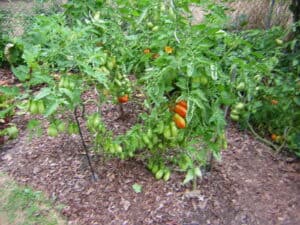
Article and photos by Rob Danforth
Tomatoes, like some pets, need constant attention: support leaves and keep branches off the soil, maintain good air circulation throughout the plant, aerate (loosen) the soil for air and water penetration, keep the soil moist, remove weeds, keep plants away from corn, dill, fennel, and brassicas (cabbage family), and grow them side by side with basil for taste enhancement. Tomatoes are heavy feeders with big thirsts and they do not tolerate dry conditions gladly. In addition to nitrogen (N), phosphorus (P), and potassium (K), they need a good source of calcium and other trace elements.
You have “hardened off” your seedlings and you are now transplanting your tomatoes: be prepared for some transplant shock (e.g., leaves look wilted and plants may appear doomed). With water and sunshine, they should rebound in a day.
Tomatoes are ground crawling vines, but we keep them up off the ground for a variety of reasons concerning plant health. Therefore, add upright supports early to pot or plot. The choice of supports will depend on whether you plunge them into the soil or place free-standing supports over or near the plants:
● Plunge in-soil: cages, stakes (e.g., hardwood, bamboo, plastic coated metal rods, foraged deadwood branches, recycled items, …), or spirals. I have also seen tomatoes bound to sunflowers for support. 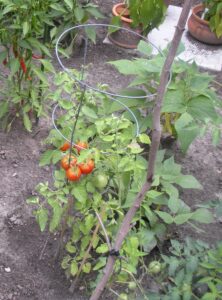
● Free-standing: lattice, trellis, do-it-yourself tripods (bamboo, hardwood, plastic coated metal + home-made concentric rings of sisal cord), or a nearby fence.
Here you have choices to make: 1- let your tomato plants grow unrestrained, fending for themselves with only the mulch for protection, or 2 – restrain your plants for more gardener control in the garden. If you choose unrestrained, you will have more tomatoes than you can use, and perhaps more problems than you expected (e.g., access, sprawl, breakage, disease, insects, …). If you choose to restrain your plants you will have fewer problems, less wastage, and fewer but better tasting tomatoes. A restrained plant is less likely to encounter problems and plants with fewer tomatoes can concentrate on improving the fruit they have rather than preparing for all the fruit they are capable of producing. To restrain your tomato plants, keep them in the cage or close to the support.
Remove all side shoots (new major branches usually start at the base of the plant but may sprout anywhere from the main stalk) and suckers (a shoot that grows up from the middle of a joint between a minor branch and the main stock). These will turn the tomato plant into a dense, sprawling bush. Unsupported side shoots will bend to the ground with the weight of the tomatoes and may actually break off the plant, especially in a wind. Unrestrained tomatoes in cages will fall over, cage and all, and end up on the ground. When you cut the leaders to limit tomato production to 6 or 8 great tomatoes per plant, the plants will continue to grow bushy, so restraining will be an on-going gardener activity.
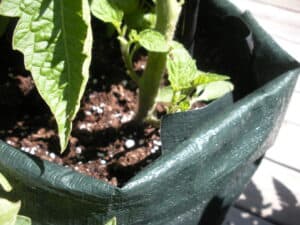
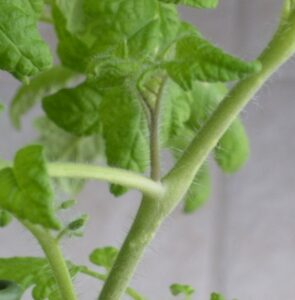
Ties: Bind your tomatoes to stakes, trellises, or fences with
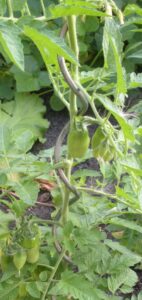
Mulch: Tomatoes planted and supports in place, you can now add mulch to conserve moisture, prevent weeds, and keep the leaves and tomatoes from encountering the soil. An organic mulch (e.g., straw, shredded leaves, bark, …), will allow water and air to get to the soil, and also prevent soil splash onto the leaves. Unfortunately, plastic will prevent water and air from getting to the soil to keep it healthy, and old floor coverings, as they disintegrate, can add unwanted material to your garden (e.g., synthetic fibres, industrial glue, fire retardant chemicals, rubber, polyester, …).
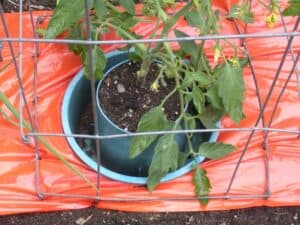
If you are not using mulch, weed regularly. Mother nature will cover any bare soil within two weeks with greenery you will probably not appreciate. 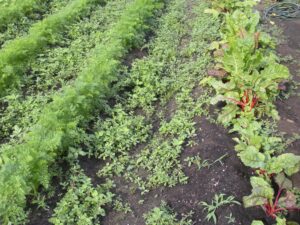
Water: Tomatoes can drink a gallon a day in summer heat. The soil must be continually moist and never dry out! However, tomatoes are not aquatic plants and they can drown! When you water, do not wet the leaves! Water only the roots, and water twice. The first water opens the soil and makes it receptive. The second watering goes deep. A watering can is best to help you target the roots only. Hoses and sprinklers are inaccurate; they shower everything and miss some important areas under plants. A thirsty plant wants a deep drink, not a bath! 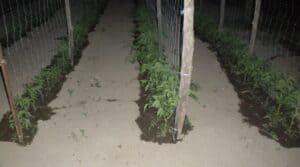
Rain water is best, but tap water is fine if it is saved in a bucket and allowed to off-gas (chemicals added for our safety) and warm up to the air temperature for 1 to 2 hours.
Absentee watering (for that weekend away!): consider a 2-litre pop bottle and a plastic or terracotta low-flow spike, a wine bottle and terracotta spike, a terracotta syphon system, or an automated low-flow system of tap lines. 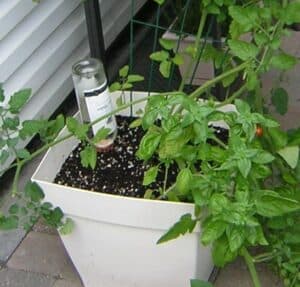
Aerate the plants by trimming bushy areas for good ventilation throughout the plant, and aerate any compacted soil for air and water penetration (e.g., loosen with a 3-prong claw cultivator or 2-prong Jekyll weed fork — Tip: a recycled chop stick also works!). Note: soil in containers condenses with each watering and must be loosened at least once every 3 weeks for air and water penetration. Garden soil must be aerated if it has been stepped on.
Add a temporary sun screen if the sun is too strong. Surprise! Tomatoes can get sunburn!
Add a windbreak, if necessary, to reduce wind damage and drying. Happy Gardening!
DTE Tomato series: Starting &Transplanting, Maintenance, Disease & Stress Management, Tomato Salvage & Seed Saving.